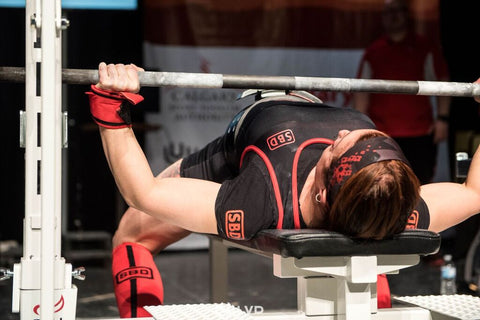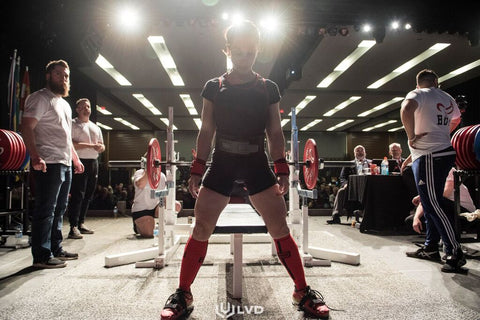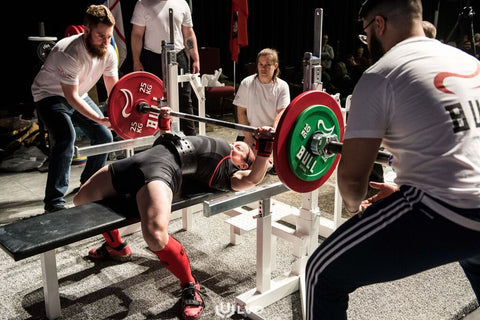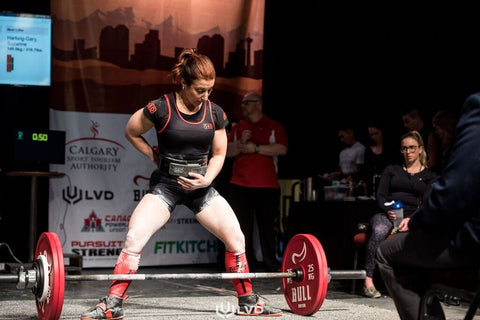Find the Joy
by Joanna Rieber
This past year of lifting has been fraught with difficulty for me both physically and mentally. Most lifters I know who have been in the sport for any length of time have had similar experiences to share. When you are new to a sport everything is fresh and exciting; over time the enthusiasm can certainly become fluctuant as PR’s become few and far between, injuries become a hindrance, and even politics and unforeseen drama can taint the overall experience.
I’ve hence decided to write about a few topics generally themed around finding the joy in lifting, and lessons I’ve learned in this regard. The title was easy; anyone who knows me well will recognize this statement as I often send it to fellow lifting friends who are struggling with lifting either physically or mentally. And the statement holds true: we often have to remind ourselves why it is that we lift and what positives we can take from it even when things are going poorly.
Photo Credit: LVD Media
A recent example of being reminded of the simple joy I find in lifting came unexpectedly on a work trip to NYC. I was travelling with a group of colleagues, the hotel had messed up our reservations, and to top it off there happened to be an explosion in the subway just outside our hotel on the Saturday morning. I had intended on attending a few talks and then heading to a powerlifting gym in Brooklyn to sneak in a bench session. Well now the trains were closed, Times Square was a crowded mess and I seriously just wanted to stay in bed. Instead I headed to Brooklyn (which took almost 45 minutes each way) and checked in for my little bench session. The gym was fabulous, I felt really young and hipster, and I met a few lifters. It wasn’t until a solid hour after my return from the gym that I recognized how infinitely better my mood had become just from going and lifting. It wasn’t even a great bench session to be honest, and getting there and back ate up a good chunk of my day. However just the ability to reach out to my lifting family, find a gym, and go have a decent little lifting session did wonders for my mood.
There will be days of course where the last place we want to be is in the gym, and there will be sessions that suck the life out of us for one reason or another. But the important thing is to recognize whether the positives outweigh the negatives. If you find yourself in a position where the opposite is true, it’s time to ask yourself why, and work towards making training a mostly positive experience once again. The ‘why’ will obviously be different for everyone, but nothing changes if nothing changes. Below are a few lessons I’ve learned in my short lifting career, which have consistently helped me shift the balance back towards a positive experience.
Photo Credit: LVD Media
1. Learning to Calm Down about Training.
I’m an exceptionally type A personality. This has served me well in most of my life – who doesn’t want an OCD anesthesiologist right? It has served me well to some extent in lifting, but it can certainly also be a hindrance. Not so long ago I would completely obsess about my training, my sessions, missing sessions, underperforming in sessions, manipulating my life to accommodate sessions, ruminating about poor sessions - I could go on and on here. Over the past year I’ve had to deal with multiple injuries, which have forced me to stop training for long periods of time. A year ago this would have sent me over the edge - how could I possibly NOT TRAIN??? This year I was able to look at training with a bit of perspective. Underperforming in a training session should not set your mood for the day or seriously affect other areas of your life. Missing a session, a week of sessions, a month of sessions even was not going to be the end of my life as a lifter. Powerlifting isn’t going anywhere – it will always be there when you are ready to train again.
2. Remembering that this is my Hobby and not my Job.
It was suggested to me recently by a friend that I was not a one-dimensional lifter. I’m still not entirely sure what they meant by this, but perhaps my age, my job, my life, and experience with injury have allowed me to slowly develop a different view. And perspective is important. As athletes this is purely a hobby sport – no one is going to make a living as a powerlifting athlete alone. Of course many people have businesses based around this sport, but as an athlete this sport is not a career.
Sometimes we have to take a step back and recognize that every day we can step into the gym, every day we are able bodied people able to train and lift, every time we step onto that platform, we are fortunate and lucky to be able to do something we love.
Photo Credit: LVD Media
3. Learning to Overcome Performance Anxiety.
I was a terrible competitor as a gymnast, not because I was a terrible gymnast, but because as a child athlete I never learned how to properly deal with performance anxiety. I’d love to say that as an adult athlete I’ve never had to deal with this, but in fact the opposite is true. I was an exceptionally anxious competitor when I first started lifting, to the detriment of my performances. People often comment on how calm I appear on the platform now – this didn’t happen overnight. It required time and effort in both recognizing and dealing with that anxiety. I had to have a long chat with myself because the level of anxiety I used to experience turned meet day into an extremely unpleasant experience. I wasn’t interested as an adult athlete in continuously creating very negative experiences for myself in my spare time. I did some reading, spoke with more experienced athletes, and found a method that works for me. Mostly it came down to ‘knowing my number’ – the level of excitement or arousal at which I perform best in competition, and finding reliable ways to replicate this on meet day. I still get nervous and anxious, but it’s no longer an overwhelmingly negative experience for me.
4. Learning to Deal with Injuries.
This past year of training has been more about steps backwards then steps forward for me to be honest. I have a serious spine deformity which bothers me to some degree every day, and will likely at some point require major surgical intervention and/or and end my three lift career. On top of that I’ve had two acute unrelated injuries that required me to stop training completely for weeks at a time. I also haven’t been able to complete a 3 lift meet in almost a year. My reaction to all of this was less dramatic then I had thought it would have been. Stressing and obsessing about training time lost, strength loss, atrophy etc., was not going to enhance recovery or really do much for my mood in general. Instead I tried to take it one day at a time, happy for the lifting I was able to do at some points this year, and the upper body gains I made while my lower body was recovering.
Photo Credit: LVD Media
In summary life is short. Perspective is a meaningful tool. Remember to be thankful to be capable of participating in such an amazing sport to whatever degree, and to have met some of the extraordinary people in our little powerlifting world. Respect your able body and your able mind and what they allow you to do. Be inspired. Be fierce. Be competitive. But above all, remember to Find The Joy.










